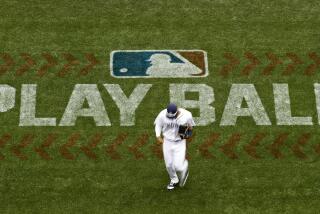Fans, You Have Been Heard
- Share via
The miracle of these latest baseball negotiations has been the silence. No lord or lady of the game has declared the players the enemies of civilization. Nor have the players reminded the lords and ladies that only the players’ talents give them a product to sell. For a year, sweet silence has enveloped the combatants.
There have been no noon news conferences followed by midnight news conferences followed by appalled reactions followed by sour media conjecture followed by idiot pronouncements followed by in-your-face posturings.
The silence ended with a whisper over the weekend, a whisper of hope that peace was at hand.
If so, we should stand and applaud.
Not for the lords and ladies.
Not for the players.
The praise goes to those folks who created the silence and demanded it be used to produce a new collective bargaining agreement.
Those folks are the fans.
If baseball arrives at labor peace, it would be because the fans were fed up and let everyone know it.
They screamed into every television camera seeking their opinion. If they saw a reporter with a notebook, they told the reporter they thought baseball had lost its ever-loving mind. Radio’s ubiquitous sports talk shows were filled with vituperation, denunciation and castigation. Folks were plain mad.
Mostly, rather than go to games, they stayed home.
“The fans are saying, ‘Fool me once,’ ” Atlanta Braves broadcaster Skip Caray said, “but, ‘You’re not going to fool me twice.’ ”
You can dislike Marge Schott. It’s easy. But people didn’t stay away from Reds games because of Schott. They may even have admired her; she is a product of her environment, namely Cincinnati.
No, fans stayed away in Cincinnati for the same reason they stayed away everywhere. They didn’t like anybody. They looked at baseball and saw only greed-mongers, owners and players alike.
It can be argued that players are on the side of the angels in any philosophical debate with owners. That continues to be the operating foundation in this space. And yet there comes a time when being with the angels is not good enough. This is one of those times.
The debate has passed from “Who’s right?” to “Who’ll survive?” And when survival is the stake, even those debaters who have right on their side must give ground to a powerful opponent so wrong-headed that, in a phrase born in Vietnam, he would burn the village to the ground in order to save it.
The owners had shown they would do that. They formed teams to play major league games using players kindly called replacements, unkindly called scabs and universally seen as palpable evidence of the owners’ disdain for their customers. It was as if Ford, Chrysler or General Motors, after 90 years of selling good stuff, decided to fight an angry auto workers union by scrounging jalopies from all across America and rolling them into showrooms for sale at new car prices.
Not only did the owners do that, they earlier precipitated a players’ strike. Then, by canceling the 1994 World Series, they did the unthinkable. They did what the Depression couldn’t do, what Hitler couldn’t do, what an earthquake couldn’t do.
And they did it all on the claim of being a failing industry. They cried about losing money. They cried even as they set attendance records and expanded the size of leagues. But their tears, however heartfelt, were never enough to move them to open their financial records for public inspection.
Not that a private business should do that. But if baseball’s owners want the players to believe they’re losing money when all the public evidence suggests otherwise, they need to show the contrary evidence.
Without such evidence, it was easy for players to believe the owners’ arguments were as much with each other as with players. Some owners with teams in smaller cities didn’t like that owners in big cities made more money and thus could pay more money for players.
Well, if that’s a problem, it’s an owners problem, not a players problem. As the NFL found ways for teams to share revenues, major league baseball needed to find a way.
Maybe, let’s hope, they’ve found a way to share the loot. And maybe the players have given ground--by accepting a salary cap, by accepting a luxury tax that would inhibit spending on players--which would make it more palatable for big-city owners to help their small-city partners.
Jim Bunning spoke to both sides in his Hall of Fame induction speech at Cooperstown. Now a U.S. congressman from Kentucky, the old pitcher addressed the owners: “Get your house in order. Figure out how you want to share your revenues without going to the players and asking them to foot the bill. Get an agreement with the players--a long-term agreement--a minimum of 10 years.”
He addressed players: “Realize your obligations as professional athletes and look beyond your contractual obligations and accept the fact that you also have an obligation and duty to the game of baseball--and to yourselves as human beings--to conduct yourself as gentlemen at all times and in the best interests of the game. . . .
“Remember that the fans are the reason you are being paid the salaries you make. Treat them with dignity and respect. Always remember that without the fans, both the owners and players are without franchise of any kind.”
If baseball doesn’t get an agreement this time . . . if the owners take the players to court again . . . then the players might break away and form a league of their own . . . and then?
“You and I know,” Bunning said, “that the game will not survive another work stoppage.”
More to Read
Go beyond the scoreboard
Get the latest on L.A.'s teams in the daily Sports Report newsletter.
You may occasionally receive promotional content from the Los Angeles Times.






